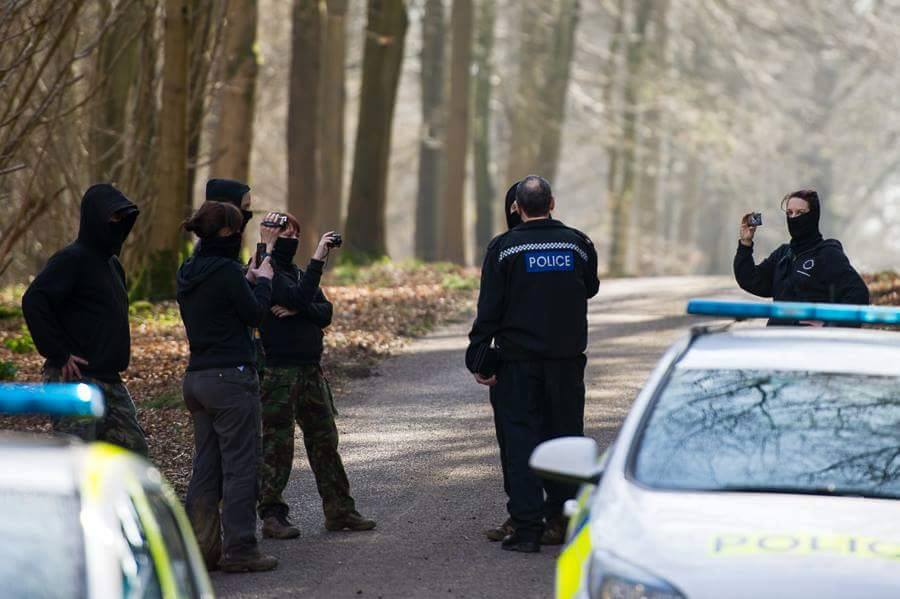
The Essentials
Make sure everyone is aware that the police will be present (and not on our side) and that everyone has the number of a trusted solicitor.
If you are Arrested
- Do not panic
- It is a good idea to let someone know you have been arrested (e.g. central contact, HAS legal officer)
- Phone your solicitor, not only will they provide you with legal advice, they can tell the police if they are acting unlawfully and a reassuring friendly voice can be a great help when you have been in a cell for hours.
- Try to avoid using the Duty Solicitor (i.e. DON'T)
- Follow your solicitor's advice but the best thing to do if you get interviewed is to say nothing; reply "no comment" to every question. The police will try all sorts of crafty tricks to get you to talk - do not get into small talk no matter how innocuous it may seem. You need only give your name, address and date of birth and nothing more.
- The police may ask to take your fingerprints/photograph - ask your solicitor's advice, but it is advised that they cannot take your photo against your will and fingerprints can be taken by force if you have been charged with an offence
How the Police interview
- Try to adopt police attitudes e.g. nice and Nasty, PC persistent, constable irrelevant. Ask mundane questions to try and catch the interviewee out.
- Turn into an utter bastard
- Your mates have already
- You've missed the last bus
- Co-operate or we'll hold you longer
- Your mates are talking and all pointing the finger at you, you'll need to tell us what happened else you're going to get in real trouble
Sample Questions
These are the sort of questions you can expect to be asked in an interview regarding aggravated trespass
- Do you require legal advice?
- What were doing in the area?
- Do you live locally?
- Who were you in company with today?
- DO you want to tell me your views on hunting?
- Previously in the day you were told that you were excluded from the area, do you recall being spoken to by a police officer?
- Do you know what the people with you have been arrested for?
- Have you ever been arrested before?
- Have you ever attended any hunts before?
- Have you any excuse for being in the area?
- Do you understand that this is the only chance you'll get to tell us your side of the story?
- Is there anything you want to say now that counters the allegations made against you?
- Are you a hunt saboteur?
- Are you a member of the League Against Cruel Sports, Protect Our Wild Animals or any other animal welfare organisation?
- What is this for (showing you a spray, horn or whip)?
- Will you accept a caution?
As ever the reply NO COMMENT cannot be used too much - remember the interview is designed to gather the evidence to charge you - do not help them out.
If you are waiting for a solicitor or other legal advisor you can use a delaying answer to stall the interview until you can find out what the charges being brought against you are all about. Even then it has always been the best thing to stay silent through any interview.
"I do not wish to answer any questions as yet because I feel at this stage you have not given me adequate information about the allegation against me and I believe that you have failed to disclose to me important information concerning the allegation."
The law may have changed but many people think that the right to silence makes little difference to how people will be processed in courts over the country. Remember they still can't force you to make a statement or give any details apart from your name and address and date of birth. So, still NO COMMENT all the way.
Sections 27 - 30 Bail
The new sections regarding bail came into force at the same time as the amendments to the right to silence. These clauses allow the police for the first time to impose bail conditions upon police bail. The police can impose all the conditions which the courts currently impose except they cannot direct the defendant to reside in a bail hostel. Bail conditions may only be imposed to make sure that a defendant:-
- surrenders to custody
- does not commit an offence on bail
- does not interfere with witnesses or obstruct the course of justice
- makes him/herself available for the purpose of enabling enquiries to be made or reports to be written.
There is no exhaustive list of the conditions which can be imposed, any condition which appears realistic (by the police) will be considered. The most common ones are; sureties, security, reporting to a police station, curfew, non-communication with prosecution witnesses and banning from an area or county.
Sureties
A surety is someone who puts-up money and is obliged to use every reasonable effort to ensure that the defendant appears in court. If the defendant does not attend the court has a discretion whether to make the security pay the money over.
In deciding whether to accept a person as surety a court will consider:
a) the surety's financial resources
b) their character and any previous convictions of his, and
c) his proximity (his relationship, place of residence or otherwise) to the person for whom he is to be surety.
The suitability of a surety is determined by a magistrate, a magistrate's clerk or an inspector at a police station. It would seem unlikely from a practical point of view for the police to regularly impose sureties on police bail.
Back to a basic guide to laws affecting sabbing in England and Wales

